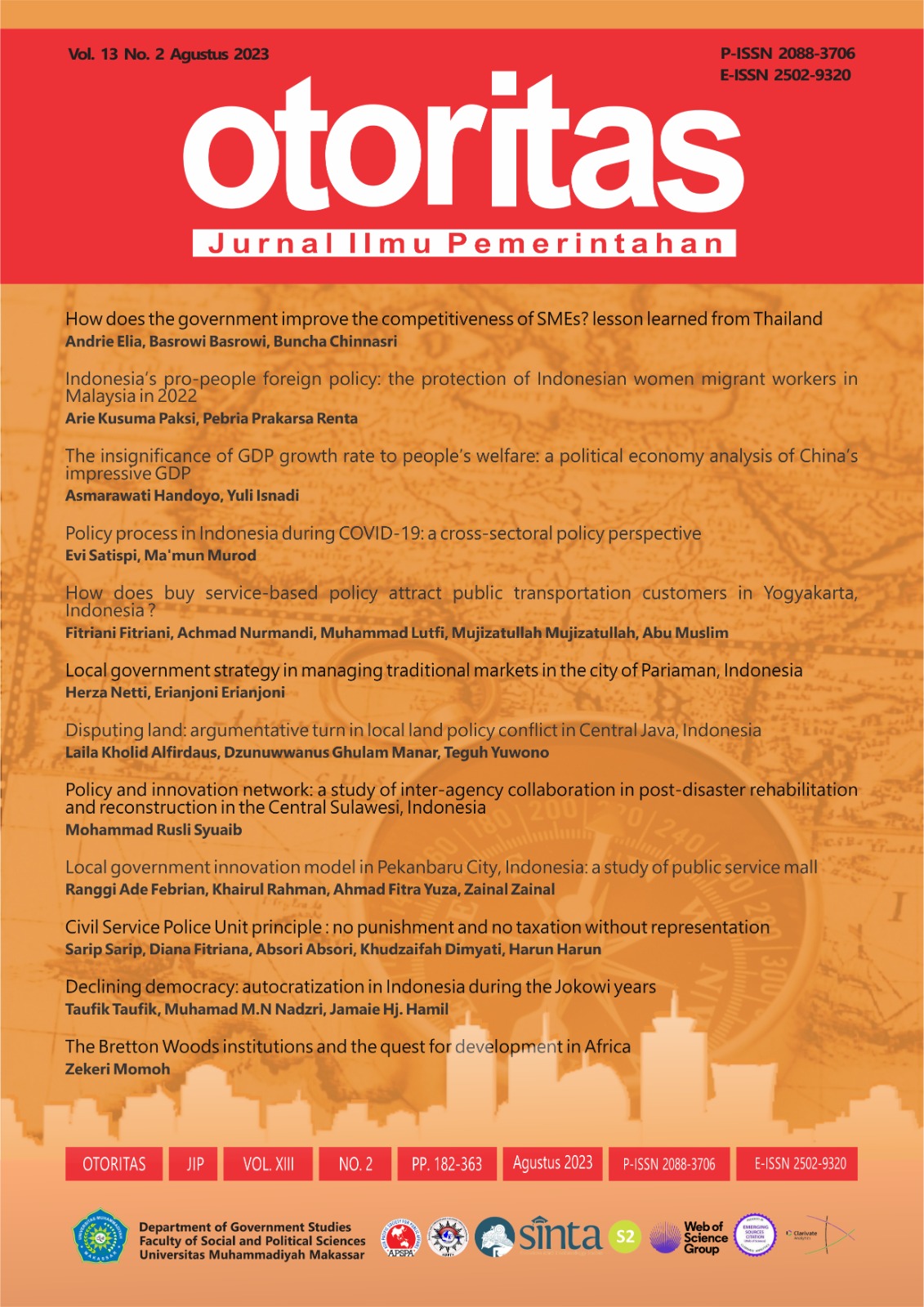The Bretton Woods institutions and the quest for development in Africa
DOI:
https://doi.org/10.26618/ojip.v13i2.11938Keywords:
Bretton Woods institution, debt, poverty, policiesAbstract
The role of the Bretton Woods Institutions in Africa has been subjected to intense debate in the literature of International Relations. This is so particularly because of the implications of the Bretton Woods Institutions on the political and economic activities in Africa. The data for this study were collected from secondary sources such as textbooks and journal articles while content analysis was used to analyse the data collected. The "False Paradigm Model," propounded by Michael Todaro which is a variant of the Dependency theory, was used for this study. This study revealed mechanisms put in place by the Bretton Woods Institutions in its relationship with African states and it also undertook a critique of the Bretton woods institutional approach to Africa’s development using the false paradigm model. The study further revealed that in spite of experimenting with external development methods and initiatives by the Bretton Wood Institutions, African Economies have not advanced much in terms of development. It implies that African nations must turn within to find it rather than focusing on the Bretton Woods Institutions requirements.
References
Action against Bretton Woods, (1994). Women for a just and healthy planet. Economic and Political Weekly. 29(27),16-18.
Arie Reich. (2010). Bilateralism versus multilateralism in international economic law: Applying the principle of subsidiarity. The University of Toronto Law Journal. Vol. 60(2), 263-287. DOI: 10.3138/utlj.60.2.263
Bird, G. (1994). “Changing Partners: Perspectives and Policies of the Bretton Woods Institutions”.Third World Quarterly, 15(3), 483–503. https://doi.org/10.1080/01436599408420392
Bordo, M. D. & Eichengreen, B. (1993). A retrospective on the Bretton Woods System. Chicago and London. The University of Chicago Press. p.9
Bordo, M.D. (1995). Is there a good case for a new Bretton Woods international monetary system? The American Economic Review, Vol. 85, No. 2, Papers and Proceedings of the Hundredth and Seventh Annual Meeting of the American Economic Association Washington, DC. pp. 317-322
Codesria-Twn-Africa Report (2002) Africa and Development Challenges of 21st Century being a Conference on Africa’s Development Challenges in the Millennium Accra 23-26 April 2002. (Council for Development and Social Science Research in Africa) and the Third World Network-Africa (TWN-Africa)
Cohn, T.H. (2000). Global political economy: Theory and practice. New York: Longman.
Eiras, A. (2003). “{IMF} and World Bank Intervention: A Problem, Not a Solution”. The Heritage Foundation: Leadership for America, 4999(1689)
Fox, J. A., & Brown, L. D. (Eds.). (1998). The struggle for accountability: The World Bank, NGOs, and grassroots movements. Cambridge, MA: MIT Press.
Gavin, M., & Patrick, D. (1995). The World Bank in historical perspective. The American Economic Review, 85(2), 329–334. https://www.jstor.org/stable/2117942
Geoffrey M. Hodgson (2006) What Are Institutions?. Journal of Economic Issues, 40(1),1-25, DOI: 10.1080/00213624.2006.11506879
Georg Schwarzenberger. (1948). “The province and standards of international economic law” The International Law Quarterly, 2(3), 402-420
Gerber, J. (2014). “International Economics (6th ed.)”. Boston: Pearson
Helleiner. G. K. (1984). An agenda for a new Bretton Woods. World Policy Journal, 1(2), 361-376
Herbert Morais and Alvaro de Soto. (1996). The Bretton Woods Institutions: Coping with crises. The Proceedings of the Annual Meeting American Society of International Law, 90, 433-442
John W. Pehle. (1946). Bretton Woods institutions. The Yale Law Journal, 55(5), p1128
Joseph J. Norton. (2009). Comment on the Developing Transnational Network(s) in the Area of International Financial Regulation: The Underpinnings of a New Bretton Woods II Global Financial System Framework. The International Lawyer, 43(1), 175-204
Karsten Nowrot. (2011). Transnational corporations as steering subjects in international economic law: Two Competing Visions of the Future?. Indiana Journal of Global Legal Studies, 18(2), 803-842.
Keynes, J. M. (1971). The collected writings of John Maynard Keynes. London: Macmillan p.10
Kunibert R. (2008). Bretton Woods Institutions and the rule of law. Economic and Political Weekly, 43(38),49-55. https://www.jstor.org/stable/40277976
Kwagyang, U.G., Ghide, B.H., & Haruna, L. A (2015). Bretton Woods Institutions: Their evolution and impacts on the field of international economic law. Journal of Law, Policy and Globalization, 35,42-55.
Mahnaz, F, (1998). Alternatives to dependence on Bretton Woods Institutions (BWIs): Pakistan Horizon, 51(3), 21-32
Moggridge, Donald. (1980). Activities 1941 - 1946: shaping the post-war world, Bretton Woods and reparations. London: Macmillan Pp.12 -13.
Momoh, Z. (2016) African Solutions to African Problems: A Critical Appraisal Journal of African Union Studies Volume, 5(1), 39-62. https://hdl.handle.net/10520/EJC188637
Obiozor, A.G. & Ajala, A. (2008). Africa and the UN system: The first fifty years Lagos. NIIA
Potter, R.B., Binns, T., Elliott, J.A. and Smith, D. (2004). Geographies of Development. Harlow: Pearson Education Limited
Rogoff, K. (2003). “IMF Strikes Back”. Foreign Policy 134 (Jan/Feb): 38-46
Saka, L. and Momoh, Z. (2015). New partnership for Africa’s development and Africa’s development. Presented at the International Multi-Disciplinary Academic Conference on African Transformation and Development organized by Cambridge Publications and Research International at the University of Ilorin March 12th-13th 2015
Shihata, I. F. I. (1995). The World Bank in a changing world. London: Martinus N. Publishers.
Todaro, M. P., & Smith, S. C. (2012). “Economic Development” (11th ed.). Boston: Addison-Wesley.
Woods, N. (2006). The globalizers: The IMF, the World Bank and their borrowers. Cornell University.
Zoellick, R. B. (2012). “Why We Still Need the World Bank: looking beyond aid”. Foreign Affairs, 91(2), 66–78.
Downloads
Additional Files
Published
Issue
Section
License
The Editorial Team of Otoritas: Jurnal Ilmu Pemerintahan reserves the right to transfer the copyright of the article once it has been accepted and a decision has been made to publish it.
Department of Government Studies, Faculty of Social and Political Sciences, Universitas Muhammadiyah Makassar in collaboration with Muhammadiyah’s College Association of Government Studies (AIPPTM) and Asia Pacific Society for Public Affairs (APSPA) as the publisher of Otoritas: Jurnal Ilmu Pemerintahan holds the copyright of all articles published in this journal.
The Publisher holds the right to reproduce and distribute the article and author is not allowed to publish the same article published in this journal.
Statement of Authenticity and Manuscript Copyright can be downloaded: here
After filling in the statement letter, please send via e-mail: otoritas@unismuh.ac.id






